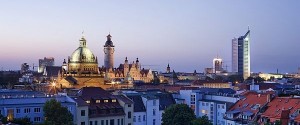Leipzig, the great city of Bach and Mendelson, has made a remarkable, if belated, advance since the days of the Monday Prayer meetings in St Nicholas Church (Nikolaikirche), the peaceful cradle to the peaceful overthrow of communism and the fall of the Berlin Wall. (This is an account of my recent visit.)
At first the economy was in poor shape, and an air of shoddy decay, and polluting factory smoke (in 1989 it was said to have the worst air in Germany), hung over the small city. Leipzig was half derelict. The East German authorities had allowed many late-nineteenth century buildings to fall apart.
The start of the revival came in the early 2000s, when Porsche and BMW began manufacturing there. The flow of cash helped the city to renovate. In the space of 15 years Leipzig has worked its way up to become the third most economically powerful city in Germany, pushing the banking metropolis of Frankfurt into fourth place. (Munich and Berlin are first and second.)
As a place to visit, Leipzig received prime endorsement in 2010, when the New York Times listed it as one of its “places to go” that year, commending its music scene and busy, growing community of artists.
That year the Bach Museum (www.bach-leipzig.de) reopened. The newspaper praised the Museum of Fine Arts (www.mdbk.de), toasting the reputation of the New Leipzig School of artists in the contemporary art world, and the Spinnerei (www.spinnerei.de), a former cotton mill turned into 11 galleries.
News magazine Der Spiegel went further, extolling the city as “Berlin, but better” in an article about the nightlife.
The New York Times returned to the city in 2014, with more rosy compliments – “It has been born anew as a cultural mecca — and, just maybe, the New Berlin.” (The headline was more qualified – “New Berlin or Not, Leipzig has a new Life.”
Promoting the city’s creative economy, one ad campaign ran the provocative (to Berlin) line: “Leipzig ist das bessere Berlin” [Leipzig is the better Berlin].
It may sound remarkable to British ears, but the current mayor pledges to devote 10 percent of the city budget to culture. This, after all, is the city of Bach, Mendelssohn, Schumann and Wagner.
The city council, and again, it’s interesting that the decision lies in their hands, has just appointed Andris Nelsons as the youngest cantor (conductor) in the last 150 years of the celebrated Gewandhaus Orchestra. He replaces Riccardo Chailly, hwo conducts his last concert in June 2016.
This compact, walkable, easy-going city (“Die Leipziger sind gemütliche Leute,” [roughly “laid-back, relaxed, jovial”] a taxi driver told a blogger) faces a bright future, perhaps soon to be free of comparison with its near neighbour. How about “The New Leipzig”?

